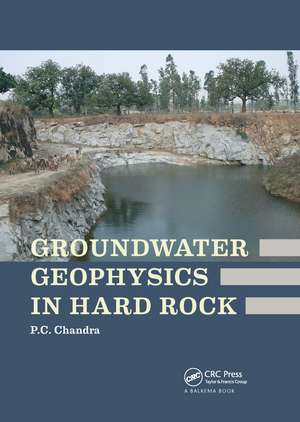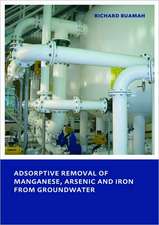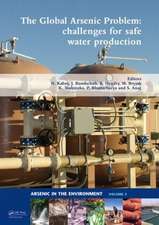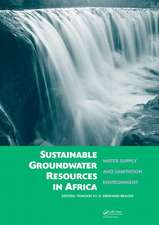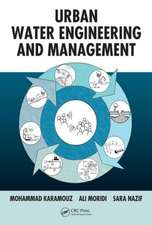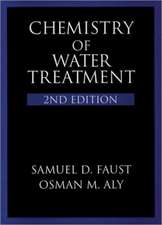Groundwater Geophysics in Hard Rock
Autor Prabhat Chandra Chandraen Limba Engleză Paperback – 31 mar 2021
Preț: 444.80 lei
Nou
Puncte Express: 667
Preț estimativ în valută:
85.12€ • 88.54$ • 70.27£
85.12€ • 88.54$ • 70.27£
Carte tipărită la comandă
Livrare economică 14-28 aprilie
Preluare comenzi: 021 569.72.76
Specificații
ISBN-13: 9780367783358
ISBN-10: 0367783355
Pagini: 384
Dimensiuni: 174 x 246 x 20 mm
Greutate: 0.66 kg
Ediția:1
Editura: CRC Press
Colecția CRC Press
ISBN-10: 0367783355
Pagini: 384
Dimensiuni: 174 x 246 x 20 mm
Greutate: 0.66 kg
Ediția:1
Editura: CRC Press
Colecția CRC Press
Public țintă
Professional Practice & DevelopmentCuprins
1 Groundwater issues in hard rock & geophysics; 2 Introduction to the hydrogeology of hard rock; 3 Introduction to geophysical investigations in hard rock; 4 Planning of geophysical surveys; 5 The magnetic method; 6 The electrical resistivity method; 7 The self potential method; 8 The mise-a-la-masse method; 9 The frequency domain electromagnetic method; 10 The very low frequency electromagnetic method; 11 The time domain electromagnetic method; 12 The borehole geophysical logging methods; 13 Integrated geophysical survey; 14 Geophysical methods in management of aquifer recharge & groundwater contamination study
Notă biografică
Dr. Prabhat C. Chandra, a professional groundwater geophysicist, was born in Varanasi, India in 1950. He received B.Sc. and M.Sc degrees in Geology and Geophysics from Banaras Hindu University (BHU) in 1970 and 1972 and was awarded the N.L. Sharma Gold Medal in Geology and first rank in Geophysics. Soon after, Dr. Chandra started his career as a groundwater geophysicist at the CSIR-National Geophysical Research Institute, Hyderabad (NGRI) India and in 1978 joined the Central Ground Water Board (CGWB), Govt. of India. His doctoral thesis was on groundwater geophysics. He superannuated in December 2010 at the age of 60 as Director, CGWB.
During his 38 year professional career he has had ample opportunity to work on a variety of groundwater issues in almost all the hydrogeological terrains of India including hard rock, coastal tracts, limestone, basalts, alluvium, desert, islands and hilly tracts. In view of the scarcity of groundwater in hard rock he took up the challenging geophysical investigations of delineating fracture zones in hard rocks which cover two thirds of the country. There are several papers and reports to his credit.
He was trained in groundwater management through an Indo-British Fellowship from the UK. He attended World Water Week, Sweden and visited the Hydro Geophysics Group (HGG), Aarhus University, Denmark for presentations on groundwater geophysics. At Allahabad University, Central University, Patna and the Indian School of Mines, Dhanbad, he taught hydrogeology and groundwater geophysics. After superannuation he worked as a consultant to The World Bank, New Delhi and as an expert to CSIR-NGRI along with experts from the U.S. Geological Survey (USGS) and HGG, Aarhus University, Denmark for aquifer mapping in pilot projects through heliborne geophysical surveys and as advisor to WAPCOS Ltd. Govt. of India for aquifer mapping of the National Capital Region through surface and borehole geophysical surveys.
The book ‘Groundwater Geophysics in Hard Rock’ is based on his vast experience in delineating the fracture zones in hard rocks, subsurface characterization and locating high yielding well sites.
During his 38 year professional career he has had ample opportunity to work on a variety of groundwater issues in almost all the hydrogeological terrains of India including hard rock, coastal tracts, limestone, basalts, alluvium, desert, islands and hilly tracts. In view of the scarcity of groundwater in hard rock he took up the challenging geophysical investigations of delineating fracture zones in hard rocks which cover two thirds of the country. There are several papers and reports to his credit.
He was trained in groundwater management through an Indo-British Fellowship from the UK. He attended World Water Week, Sweden and visited the Hydro Geophysics Group (HGG), Aarhus University, Denmark for presentations on groundwater geophysics. At Allahabad University, Central University, Patna and the Indian School of Mines, Dhanbad, he taught hydrogeology and groundwater geophysics. After superannuation he worked as a consultant to The World Bank, New Delhi and as an expert to CSIR-NGRI along with experts from the U.S. Geological Survey (USGS) and HGG, Aarhus University, Denmark for aquifer mapping in pilot projects through heliborne geophysical surveys and as advisor to WAPCOS Ltd. Govt. of India for aquifer mapping of the National Capital Region through surface and borehole geophysical surveys.
The book ‘Groundwater Geophysics in Hard Rock’ is based on his vast experience in delineating the fracture zones in hard rocks, subsurface characterization and locating high yielding well sites.
Recenzii
Geophysics is about physics of the earth, its physical property variations and their response to induced perturbation giving a comprehensive insight into sub-surface hydrogeological conditions. I have rarely come across such a masterly treatment of the subject, so comprehensive, and penned in such a lucid language and student friendly style as in the book under review. The author P.C. Chandra, an eminent hydro-geophysicist, formerly Regional Director of Central Ground Water Board, has spent a major part of his career in the hard rock terrains of peninsular states and eastern India, namely the basement complex and Deccan traps. He has distilled his knowledge and experience gained in his more than three decades of field surveys in the pages of this book and enriched it with his priceless case studies. There are very few professionals in the country like Chandra who after superannuation from government service return to the academia prompted by sheer love of science and an urge to transmit the acquired knowledge to the young scientists, and ignite their inquisitive minds.
Almost all aspects of hard rock hydro-geophysics from the perspectives of this subcontinent have been succinctly dealt with in the book. The author has also not forgotten to add a brief section on future scope of research in this field. Neat illustrations, valuable data tables, reference lists with each chapter for future study and error free quality printing mark the book as a ‘must read’ Manual for all, – graduate and post-graduate students, research scholars, teachers, and practicing groundwater geologists and geophysicists alike. I have no doubt that it will be a treasured keep in the Reference Libraries of Universities and Institutes teaching and practicing hydrogeology and geophysics. Truly the book is a masterpiece, a stellar contribution of P.C. Chandra to geoscience education. It is a tribute to his four decade long dedicated pursuit of geophysics.
Subhajyoti Das, Geological Society of India vol. 88 (August 2016)
"This work is one of several recently published textbooks on the important topic of geophysics for groundwater studies. As the title states, this particular text focuses almost exclusively on hard rock aquifers, which include the weathered zone, and mostly excludes soft rock terrains typified by carbonates and sulfates. Surface geophysical methods emphasized in this textbook include individual chapters that address the magnetic, resistivity, self-potential, mise-a-la-masse, and electromagnetic techniques. Borehole geophysical methods are relegated to one chapter that covers typical methods, such as spontaneous potential, gamma, caliper, and neutron techniques. An important aspect of the textbook is the discussion on planning geophysical investigations; the reviewer believes this should have further emphasized the importance of geological studies prior to initiating a geophysical investigation (to better target the geophysical investigation and the integration of a geophysical survey) because application of a single technique is rarely adequate. The limited use of mathematics, the basic discussion of geophysical methods, and the very brief case history discussions make for a reasonably good introductory text on the importance of geophysical investigations for groundwater investigations in hard rock terrains.
Summing Up: Recommended. Lower-division undergraduates through faculty; professionals"
M. S. Field, U.S. Environmental Protection Agency, in 'Choice', January 2017 issue
Almost all aspects of hard rock hydro-geophysics from the perspectives of this subcontinent have been succinctly dealt with in the book. The author has also not forgotten to add a brief section on future scope of research in this field. Neat illustrations, valuable data tables, reference lists with each chapter for future study and error free quality printing mark the book as a ‘must read’ Manual for all, – graduate and post-graduate students, research scholars, teachers, and practicing groundwater geologists and geophysicists alike. I have no doubt that it will be a treasured keep in the Reference Libraries of Universities and Institutes teaching and practicing hydrogeology and geophysics. Truly the book is a masterpiece, a stellar contribution of P.C. Chandra to geoscience education. It is a tribute to his four decade long dedicated pursuit of geophysics.
Subhajyoti Das, Geological Society of India vol. 88 (August 2016)
"This work is one of several recently published textbooks on the important topic of geophysics for groundwater studies. As the title states, this particular text focuses almost exclusively on hard rock aquifers, which include the weathered zone, and mostly excludes soft rock terrains typified by carbonates and sulfates. Surface geophysical methods emphasized in this textbook include individual chapters that address the magnetic, resistivity, self-potential, mise-a-la-masse, and electromagnetic techniques. Borehole geophysical methods are relegated to one chapter that covers typical methods, such as spontaneous potential, gamma, caliper, and neutron techniques. An important aspect of the textbook is the discussion on planning geophysical investigations; the reviewer believes this should have further emphasized the importance of geological studies prior to initiating a geophysical investigation (to better target the geophysical investigation and the integration of a geophysical survey) because application of a single technique is rarely adequate. The limited use of mathematics, the basic discussion of geophysical methods, and the very brief case history discussions make for a reasonably good introductory text on the importance of geophysical investigations for groundwater investigations in hard rock terrains.
Summing Up: Recommended. Lower-division undergraduates through faculty; professionals"
M. S. Field, U.S. Environmental Protection Agency, in 'Choice', January 2017 issue
Descriere
This book presents a systematic and proper geophysical approach to groundwater exploration in hard rocks, discussing various geophysical techniques and combinations to be used, interpretation of data with case studies and drilling results and the preparation of different utility maps.
